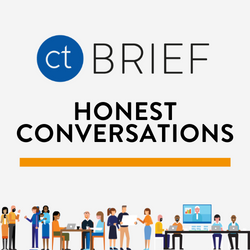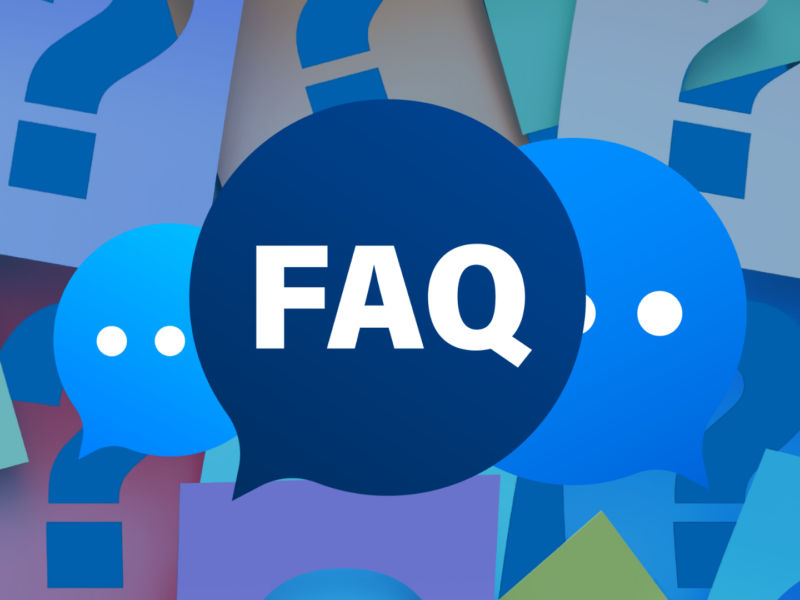Transcript for episode 2, ‘Let’s talk about wellbeing in leadership roles’.
Zina Smith
Hi and welcome to Campbell Tickell’s podcast CT Brief: Honest Conversations. In these episodes, we aim
to reflect on both professional as well as personal experiences and insights, and hope to offer you some
key takeaways that you can discuss within your networks. Join us as we have open and honest
conversations on a wide range of topics that matter to people working across the not-for-profit and public
sectors. In this episode, Gera Patel, Partner and Tracey McEachran, associate consultant at Campbell
Tickell, reflect on what they have observed in the past year around wellbeing in leadership roles, as many
of us return to offices in hybrid or another form is Autumn. Gera and Tracey discuss what leaders can do
to ensure they are looking after their own wellbeing as well as how we can take the lessons from the past
year into the present. We hope you enjoy this discussion. Let us know what you think.
Gera Patel
Hi, everyone. My name is Gera. I’m one of the partners at Campbell Tickell, and I’ve been chatting quite a
lot to colleagues, as you probably would imagine over the last few months about wellbeing in the
workplace. And I thought it might be quite interesting to share some of those thoughts. And one of the
people I’ve been chatting to has been my colleague, Tracey.
Tracey McEachran
Hi, it’s good to be with you here, Gera, and I guess it’s us in conversation because we do quite a lot of
work around leadership and leadership development, which of course, includes, wellbeing, both physical
and mental fitness really. So my specialist – or area is that leadership development and a mental fitness
so that people are fulfilled at work, happy at work and really using their – all of their resources well, and
they’re not coming in every day depleted because they’re not paying attention to all aspects of themselves
as leaders.
Gera Patel
And that’s a really interesting concept. I think, Tracey, in terms of the context of leadership, because often
when we’re talking about leadership, we quite often focus on leaders needing to take responsibility for
others. But it feels to me like the conversation has shifted a little bit. And when we talk about wellbeing in
leadership, we’re asking leaders to think about themselves. And I do wonder whether that makes people
feel a little bit uncomfortable, a little bit awkward, perhaps a little bit selfish. What kind of experience have
you had when you’ve been having those kinds of conversations?
Tracey McEachran
I think that’s it really. I think you’ve got perceptions around what leaders should be, especially if we’re
talking CEO – that they know everything, they’re the front of all knowledge. It is a little bit, you could say,
pushing it – superhero status. So, I’m here to rescue the world. I’ve got very broad shoulders and a big
brain, and I’m going to have all the answers for everybody and we can get – I think leaders can get stuck
in that role, what they think is expected of them. And therefore, think that they are a bit superhero and
then not focusing on their own wellbeing.
Gera Patel
And I don’t know about you, but some of the examples that I’ve seen, particularly in this period, where
often organisations have had to be in crisis mode, kind of managing a crisis, certainly when the lockdown
originally happened. But all of the kind of the subsequent challenges that the pandemic has brought us,
and I’ve certainly seen a few examples from leaders who have actually kind of just broken down, who
haven’t been able to kind of sustain that “hero” status. or that – “Don’t worry, I’m in control, everything is
going to be okay” kind of level of being. And actually, the fall has had huge implications, not just for them
and how they feel emotionally, but also for the people around them. And so it just strikes me that there’s
definitely something about prevention is better than cure, as it often is when we’re talking about things to
do with wellbeing and health.
Tracey McEachran
100%. It’s like driving a car with no oil, you know, 100 miles an hour down the motorway, something is
going to give and we’re so busy thinking about the destination and that we must get there. This is a must,
a should and the pressure of that we don’t pay attention. And so I think that’s what happens to leaders. All
of us get on to autopilot mode and it becomes our way of being and we get hit in the road or the treadmill
so hard we can’t see where the slow down button is and we get into a cycle of this is how it must be, this
is how it should be, and we don’t take time to get our heads up and really look at the landscape and look
at what’s going on. We just get into this – because of course, everyone is so busy and the busier you get,
the less time you have to get your head up to see what’s actually going on. So we spend more and more
time on autopilot, actually, and that’s when things start to go wrong because we’re not listening to our
body. We’re not listening to our own thoughts. We’ve got no built in time for reflecting because there’s all
this must do, should do, have to do type thing.
Gera Patel
And what kind of advice have you been giving to people who have approached you and said, “I’m
struggling”, or “I think I need some support”?
Tracey McEachran
I think the building time to reflect and there isn’t one reality. We all carry our own reality, our own
perspective of something, and we end up thinking that’s the truth. So, I think the biggest thing is to build in
time when you have energy – so not at the end of the day when you’re washed up but maybe at the start
of the day or a good time of day and stand back and go, “what’s the reality?” “What’s the evidence in front
of me?” “What’s really going on?” and “where am I getting caught up in my thoughts”. So, separating your
thoughts from the reality of a situation, if that makes sense. An example would be that say I’m talking to
you Gera and you’re telling me that something’s got to be done by next week, and I just take that as it’s
got to be done by next week. I’m not questioning. I’m not looking at the system it’s in. I’m just really
focused on the one thing, and I’ve not really challenged the thinking or my thinking around responding to
you. So, building in time to reflect, I think, is the most important thing. I’m going to say I’m a coach,
coaching is a great tool. For me, group work is the most impactful if you can get in with a group. And
that’s why we did the CEO wellbeing workshop, because you have time to sit back, take a bit of a
helicopter view on your own thoughts. But you also have the mirrors around you, other people holding up
mirrors. And that’s the most healthy way to really get things into a perspective.
Gera Patel
It’s good, isn’t it? To not isolate yourself further at this kind of time and to kind of take some comfort that
it’s not just you, that the thing that’s happening to you is probably happening to everybody or kind of
almost everybody. And to kind of get that sense of it’s okay to voice that, it’s okay to say – I was doing a
webinar a couple of months ago and we were doing a bit of sort of check- in with a group of executives
and senior leaders in an organisation. And we were kind of going around the screen saying how we were
etc. and the chief executive kind of we got to him – sort of 5th or 6th in the line-up, and he said, “I don’t
think I am okay”. And he went on to kind of tell us why he was feeling that and people in the group were
kind of visibly shocked. It was a really interesting reaction. I didn’t know that he was going to say that.
After when I spoke to him, it did feel like he was just responding to the moment and felt that it was really
important to be truthful and that sharing kind of opportunity for him really changed things around. And it
really changed the dynamic for how that leadership team were talking about moving forward, continuing
to cope, managing kind of existing and new challenges. And so, yeah, there was something really kind of
inspirational – I would say.
Tracey McEachran
For a leader to talk about their feelings or their fears or their sensitivities or feeling that things aren’t quite
right with them at the moment. It’s such a strong thing to do because you are expressing your
vulnerability. And there’s something called vulnerability based leadership. And what you do is you give
permission for everybody in the room to be honest, and that builds psychological safety. And if you look at
psychological safety, it’s one of the key building blocks for high performing teams. So, here when
someone expresses vulnerability, what they’re doing is helping the team, actually facilitating a much
stronger performance across the team, then they would be if they stayed silent, which is the exact
opposite to what people think. They think that if they express their fears or sensitivities, then they’re going
to demoralise or bring down the group. And in fact, it has is the exact opposite. And we’re not here talking
about someone that’s constantly saying how bad things are – no, this is about really expressing how you
feel in a moment, and that builds huge trust across the team, which is so good for people’s wellbeing and
performance.
Gera Patel
And some of the tips that I’ve heard from other leaders that I’ve spoken to have been they’ve kind of
ranged from the really elaborate that have taken sort of quite a lot of organisation and a real kind of “I
need to be distracted from my work. I need to create something that’s a significant distraction because it’s
the only way I can escape” – all the way down to the other end at the end of the spectrum, and some
really small things like – “I make sure that I go outside for at least 15 minutes in the day, whatever the
weather is”. And it’s interesting, isn’t it? That kind of range of things that you can do because it’s very
individual, but that range of things that actually are kind of within our grasp, within our reach. And you just
find the thing I guess that works for you.
Tracey McEachran
Yes, it’s little and often, but it’s also prioritising that because it’s very, very easy to go through your day
and start to hit your emails, phone calls or whatever – meetings. And before you know it, it’s lunchtime or
the days nearly over, we get caught up. And so actually to diarise and schedule downtime is really
important in the day. And whilst we think I don’t have time for that, in fact, you will become much more
productive and effective if you make time for it. That’s the sort of paradox in the fact that we feel we
haven’t got time, so we don’t do these things. And yet we become less efficient because we don’t do
these things. So just scheduling in those breaks, even if it’s a two minute break to stand up, look at a
painting, go for a wander around the garden or just sit and notice your breath.
Gera Patel
The little often feels like it’s been quite a good maxim for people – certain people anyway.
Tracey McEachran
Definitely. Definitely. I think, because we are busy, busy, busy people, so it is finding things that fit in with
the work and with your lifestyle. You’ve got work and home. And of course, you’ve got now that people
aren’t commuting to much, so you don’t have that down time in between – though people complained
about it. It might have been time for people to reflect. So, it is about building some of those things back in.
I think your space and time. For me, that is the most important thing – is actually putting time aside for it.
Gera Patel
I like the thing that you said about the commute thing. It reminded me of somebody who told me that
they’ve been doing a walk to and from work. So it would normally take them half an hour by public
transport to get to their office. And so every morning they walk for half an hour before they go into their
little spare bedroom. And they do the same thing at the end of the day. And she was telling me that she
hated it at first, and she kind of, like was really annoyed that she made a commitment to do it. But
actually, she now says it’s the thing that’s kind of saved her. And she puts her kind of sanity and her
wellbeing down to that hour that she takes every day going to and from work. And the kind of the
symbolic bit of “my working day has ended and now, even though I’m in the same flat, house, building –
whatever. I’m now going to do something different. I’m now focusing on something different. I’m giving my
attention to different things or different people.”
Tracey McEachran
Yeah, definitely.
Gera Patel
So we’re back, aren’t we, kind of where we started? Which is about taking the time for reflection, being
self-aware, listening to what your head, heart, your body. Perhaps listening to what other people have
probably been saying to you and, yeah, just giving yourself – almost like giving yourself permission to kind
of absorb that and think about a response to it.
Tracey McEachran
Absolutely. I think that every moment of a day is a learning opportunity about yourself. So there’s a
curiosity.
Gera Patel
You know though Tracey, when you say things like that, I will think it’s one of Tracey’s hippy sayings, but
even an old cynic like me can recognise what you’re saying in the context of how we look after ourselves
as leaders, because actually, the implications, if we don’t, are really serious, not just for us, but actually
for our organisations as well. And it’s the complete opposite of what it is that you think you’re driving to
achieve.
Tracey McEachran
That’s so much so. The point of saying how much work did you have to do to be present was nothing, you
just have to be there. And so that’s exactly – for me, leadership, us, individuals, we have huge potential,
much, much more than we ever use. And so wellbeing for me, it’s not only stopping yourself from burnout,
but it’s going from good to really fulfilling your potential – that type of thing, and really about
understanding yourself and building your own self-awareness and in doing so, helping others around you.
So, that whole bit about stop in to be curious about what’s playing out now. It really doesn’t take long.
Gera Patel
And it is about, you know, the kind of like, the achievement, the success of things, those kind of measures
that we often kind of resort to in order to kind of give ourselves or others kind of accolades. It’s like,
actually, wellbeing doesn’t sit to the side of that, it’s very much a part of that. And, you know, I do a lot of
leadership recruitment for different posts, and candidates who do well in a process, they don’t just turn up
and it comes really easily and naturally to them. They’ve put in some work and they’ve come prepared to
have some conversation about the things that challenge them. Often I think selection and interviewing is a
really good example where it’s really easy to think that you’re successful in those scenarios by being your
very best self. And that’s true to a certain extent. But I would say actually being honest about yourself is
probably more important. And I don’t know, when you’re kind of involved in either selection processes or
things that kind of have a bit more of a competitive edge, like how can we help people to sort of think
about the things that they need to do in order to kind of get ready for those sorts of scenarios? Because
that’s quite a big sort of feature of working life as well, isn’t it?
Tracey McEachran
It is, it is, and what you’re talking about there is when we’re under stress or pressure situations and what
tends to happen is – obviously, our fears come to the fore. Now, that will definitely have effect on our
behaviour if we don’t recognise what’s played out for us. So, that can turn up as humorous or arrogance,
and it can also turn up as lots of limiting beliefs and so anxiety. So these things come to the fore when
we’re feeling pressure or stressed and we’re trying to deal with our fears and our sensitivities. So,
interviewing or pressure situations, it’s that self compassion that comes to fore there or can do – and can
help in those situations. So your CEO that said that I’m not feeling quite right was a brilliant way, a great
way of articulating those fears, but not being a slave to them. And that’s what happens. I think we become
slaves, so our behaviour is driven from the wrong energy.
So, taking into an interview type thing – yes, absolutely. We’re always performing that’s a performance and be prepared. You really prepare yourself for interview so that when you arrive, you can be fully present. So, going back to your point about being present Gera, you know, we all have the ability to be present if we make the environment and prepare ourselves for that moment. And that’s the same for interviewing or when the situation’s stressful, it’s been aware what is playing out for you, preparing as much as you can, knowing that you can’t control everything, understanding what are the thoughts and feelings that are distracting you? And that again are only thoughts and feelings. They’re not a reality, their thoughts. And really listening and being present at something like an interview.
The problem is if you’re so rehearsed or you’re so in your own head or you’re trying to protect your sensitivities there, what you get is a sense of inauthenticity as an interviewer, we immediately see if somebody is not opening up to us. It’s in the body language. We cannot hide these things. So if you’re very prepared, if you really genuinely research the job you’re going for and the company you’re going to work for and you go there again with this sense of curiosity, “do we have a fit?” rather than “I need to get this right or I’m on show here.” It’s a two way conversation. It’s definitely a
process, a selection process. But it is a two way conversation. So, as soon as we get into the energy, I think that it’s really important we get this right, it’s all down on our shoulders, then we probably interfere and stress, and that’s when we cannot or we find it very difficult to be present.
Gera Patel
And something about looking ahead as well, because I think a lot of this year has been about managing
the here and now and actually sort of trying to be in a position where you can feel optimistic, feel positive
about looking ahead. And, of course, that’s going to be different things for different people. But again,
maybe it’s kind of permission to say it’s okay to talk about things that you’re going to do next year or the
year after – that you’re not just sort of stuck in the here and now.
Tracey McEachran
That is completely vital to the vision it’s completely vital. So we as human beings, we need to know the
direction of travel, and we need it to be a vision that is aspirational and is in front of us, so we all
understand what direction we’re moving in. And so, you know, we probably don’t talk about purpose and
vision enough. I encourage people to talk about that at the front of every meeting. “What’s the vision?”
“How do we want to be in this meeting?” “What are we trying to solve, and how does it fit in with the
vision?” So I’m a big sort of fan of bringing everything always back to “are we doing what we said we
wanted to do?”
Gera Patel
Are we focused on the right things?
Tracey McEachran
Exactly, exactly.
Gera Patel
Yeah. Tracey, it’s been really nice chatting, catching up with you. Yeah, really great to kind of have this
discussion, and hopefully in sharing it with others, it will feel like a continuation of a discussion as well.
Tracey McEachran
Yes, it’s been lovely being here with you, too. It’s always good to have a chat. There’s so much in that
conversation Gera, and in your questions we probably could spend a day on one question to be fair. But if
anybody listening wants to know more about psychological safety or any of the things that I’ve talked
about, then do email into us at Campbell Tickell and I’d be more than happy to provide you with links and
information on what we’ve talked about.
Zina Smith
We hope you enjoyed the second episode of CT Brief: Honest Conversations podcast. If you’d like to
delve further into these issues, head to our website where you can read the latest CT Brief Issue 55,
which contains several articles on mental health and wellbeing
Play the episode
Find out more about this podcast.
To discuss the issues raised in episode 2, contact Gera Patel on: gera.patel@campbelltickell.com or Tracey McEachran on: Tracey.McEachran@campbelltickell.com
| Campbell Tickell is an established multi-disciplinary management and recruitment consultancy, operating across the UK and Ireland, focusing on the housing, social care, local government, sport, leisure, charity and voluntary sectors. We are a values-based business and firmly place the positioning of our support and challenge on helping organisations to attain change that is well thought through, planned and sustainable. At CT, we want to help organisations create the landscape within which we ourselves would like to exist: fair, inclusive, diverse, engaged and transparent. We build from our values in how we approach all our work as a practice.
Find out more about CT’s Services. |



